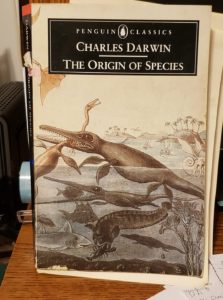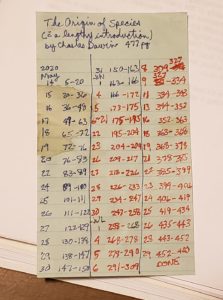
Several decades ago I read the book Origins by Irving Stone, checked out of a library. It’s what we now call creative non-fiction, not quite a novel and not quite a biography of Charles Darwin. I liked it a lot. It presented Darwin in a sympathetic way. I learned a lot about him.
Flash forward three decades. I saw Darwin’s On the Origin of Species by Means of Natural Selection at a thrift store, I grabbed it and put it on my reading pile. It sat there for several years, until May this year. Having finished another book, and ready for something new, I went searching for this book in my downstairs, storeroom library. It took a couple days of looking but I found it, exactly where I remembered seeing it a couple of years ago. I began reading it on May 14, 2020 and finished on July 29, 2020 in approximately 50 reading sessions.
Did I enjoy it? Not particularly. Did I learn for it? For sure. Do I recommend it to others? I’m not sure. It was a difficult read. The language, being from the 1850s, is somewhat archaic. Sentences are long and convoluted. Paragraph breaks sparse. It’s not exactly old English, but it’s not modern either. In addition there were lots of scientific terms, and lots of partial references to other experts Darwin consulted.

Reading it was a struggle for me. I wanted to read for comprehension, but often I found myself skimming, or reading the same paragraphs two or three times trying to understand it.
Why did I read it? I wanted to get Darwin’s theory directly from him, rather than filtered through a science teacher or science textbook. What exactly did Darwin say? Does it seem plausible? Where should I go next in researching the topics he wrote on—would there be hints in OOS that would allow me to do this? An inquiring mind wanted to know.
Alas, after reading OSS, I can’t really say I know more about Darwin or the theory of evolution. I read the book slowly, away from the television and other distractions, so I can’t blame lack of concentration. I’ll blame the other things I mentioned a few paragraphs back. I think I understand what Darwin was saying, but, by today’s standards, I don’t think it develops the theory very well. It certainly has no references. Many times Darwin says something like, “Dr. Smith informed me of his research into….” The reader, unless a contemporary of Darwin in the science of that day, has no idea who Dr. Smith is, what his field of study is, and why he should be trusted. That’s not to say it’s wrong. It’s simply impossible to know the correctness of what Darwin is saying from Darwin’s book alone.
The subject matter in the book is far ranging. Darwin covers not just the gradual change in species from what they are to completely new species over thousands (or tens of thousands) of generations, but also the concept of mutations and hybrid species.
Still, I wasn’t very satisfied by the book. I think I would have to read this at least three times to understand it. Will I ever do so? Not with this book. It was somewhat damaged when I bought it as a used book, and started falling apart as I read it. It starts with a 70 page introduction, and the first 80 pages of the book have fallen out. It was a cheaply made, mass-market paperback. It’s not worth trying to sell at a garage sale nor donating to a thrift store. No, this particular book is going in the trash—not because of what it contains, but because of its physical condition. And, if I ever do want to read it, I can access it as a free e-book at Project Gutenberg.